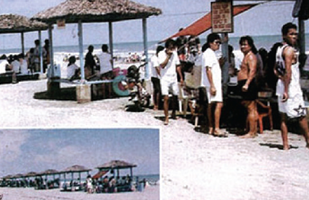
A Clean Sea, A Healthy Community (Marenu nga Bevay Gaugauayan na Tatolay)
Aparri, Cagayan
1997
Aparri is composed of 42 barangays, three (3) of which are located in the coastal areas; San Antonio, Punta, and Maura with a combined population of nearly 15,000. The seashores of these barangays were commonly known as the “longest toilet in the world" because the residents defecated and dumped their garbage in these areas as far back as their ancestors can remember. These unsanitary practices led to high incidence of respiratory diseases and increased morbidity and mortality among its residents.
Alarmed by this negative impact, the municipal government with a medical doctor as mayor conceived a program in 1993 to eradicate the practice of using the seashores as defecation area and dumpsite. Activities undertaken were dialogues and consultations with the residents, massive information and education on the importance of a healthy mind and body, clean surroundings, protection and conservation of the coastal environment. In addition, the municipal government implemented the following interventions: delivery of health services such as free regular check-up, distribution of medicines, and construction of public toilets. maintenance of the toilets by the user, installation of shallow pump wells, collection of garbage, establishment of land-fill site in Barangay Maura, planting of trees along the seashores and creation of job opportunities through the municipal government’s self-employment assistance. Municipal ordinances were translated into barangay ordinances to give teeth to law enforcement at the lowest level of governance.
After several years of program implementation, mortality and morbidity rates dramatically declined coupled with total eradication of malnutrition. All the households had access to public toilets and potable water within a short distance from their homes. The natural beauty of the shoreline was restored. The foul smelling "longest toilet" had been converted into a favorite tourist destination attracting local and overseas tourists. Hotels, restaurants and beach sheds were established with increasing occupancy rates. Around 202 poor families were provided with livelihood assistance which increased their income by 50% to 150%. Tax collection substantially improved. These accomplishments were the result of changes in attitude and behavior of the people towards health and environment.
This program is recognized as one of the Ten Outstanding Programs in the 1997 Galing Pook Awards.


